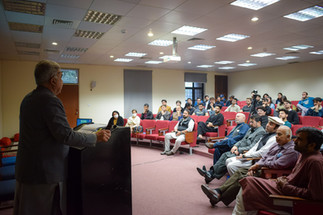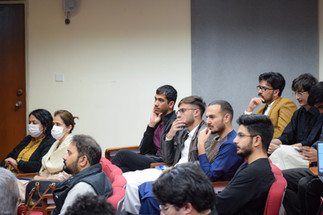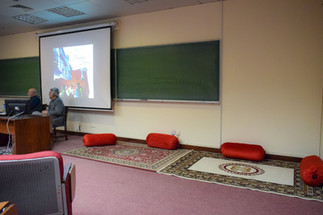Pashtun Hujra
- aishaali99
- Feb 13, 2023
- 6 min read
Updated: Aug 5, 2024
Friday, February 17, 2023 | 4:00 – 6:00 PM | A-12, Ground Floor, Academic Block, LUMS

Pashtun Hujra: Importance, Historical Traces, Present-Day Situation due to the Social Evolution, And the Future Challenges.
The Hujra has played a vital role in the spreading of political, economic, social, cultural, religious, and literary awareness in the Pashtun society. A place where elders and youngsters sit together, the Hujra has remained a pivotal point in shaping the future of the generations. From transferring the values of the Pashtun code of conduct and life to honoring the elders, Hujra covers almost all aspects of life. Structurally and architecturally, it takes many shapes and has had depending upon the region, class, and local-social values. However, due to social evolution, technological advancement, and rapid urbanization, it has been observed that Hujra is slowly losing its value and importance. It is primarily because the new generation isn’t giving due importance to the values and culture of Hujra. In the mentioned session, Dr. Noor ul Amin Yousafzai and Dr. Abaseen Yousafzai will be sharing their thoughts on the importance, historical traces, present-day situation, and future challenges posed to the Pashtun Hujra.
Dr. Abaseen Yousufzai is a professor and chairman of the Pashto Department at the historical Islamia College Peshawar. He is a prominent figure in Pashto Literature. Widely recognized nationally and internationally, a Pashto poet and scholar who has written a lot of literary columns, articles, and books, Dr. Yousafzai is also a noted radio and TV anchor. He belongs to Lower Dir, Khyber Pakhtunkhwa. He did his LLB in 1986 from Peshawar University and MA in Pashto literature in 1988. He did his Ph.D. in Pashto in 2016 and is the author of 10 books in Pashto and Urdu. He has been awarded over 400 medals and shields for his literary and social services. The government of Afghanistan gave him the presidential award for his contribution to Pashto literature. The President of Pakistan also awarded Dr. Yousafzai the Pride of Performance Award in 2020. He has three published poetry books to his credit. “Ghurzanguna” is his published book which has been published over ten times, holding the record of the first Pashto book being published that many times. His book "Alwat" was published five times and is still the best-selling book in the market even today. Not just poetry, he has seven prose books to his credit which are Roohnama, Zetoonbaano, Fun o Shakhsiat, Khutbaate Imam Khitaab, understanding FATA, Da Pukhtunkhwa Baani, and Pukhtoon Hamza. He has recently accomplished the gigantic task of compiling the Pashto syllabus for primary to intermediate level students at the Education Department, Khyber Pakhtunkhwa. In addition, he has contributed numerous features and columns to Pashto and Urdu newspapers and magazines. He has also been grooming budding poets and writers. Dr. Abaseen Yousafzai is in charge of the historical Khyber Union Hall at Islamia College Peshawar. It is indeed an honor and pride because Quaid-e-Azam Muhammad Ali Jinnah was also a lifelong member of the historical Khyber Union Hall.
Dr. Noor-ul-Amin Yousafzai has served as a faculty member at the Department of Pashto, Islamia College Peshawar. He has also served as the principal of a Government Higher Secondary School. Currently, Dr. Yousafzai is serving as a Deputy Director at the Bacha Khan (Khan Abdul Ghafar Khan) Research Center, Peshawar. As an acclaimed prose writer, Dr. Yousafzai has twenty published books to his credit. Among these, five are fiction collections, three books on folklore in Urdu namely Art, Culture Aor Tareekh; Pashto, Pashtun Aor Pashtun Wali; Pashtun, Art, Aor Culture. His latest published book is Pukhtun Wali, Khaatiray, ao SuguRhey, which is based on theory and oral history of the Pashtuns’ code of life and conduct. Furthermore, Dr. Yousafzai has more than one hundred research publications to his credit and holds a significant place in the Pashtun prose writers’ community. Also, he has been associated, from time to time, with various institutions including Allama Iqbal Open University, Islamabad, and Pakistan Academy of Literature. Moreover, Dr. Yousafzai remained on the advisory board for various Pashto Magazines including Pukhtun, Mashaal, and Tanzeem. Also, he has moderated a TV show on Khyber TV for consecutive two years while also been associated with various radio stations. Currently, he is associated with Abaseen Radio, Peshawar, where he hosts a weekly program in Pashto.
Moderator: Imad Khan, Faculty, LUMS
—
Event Coverage
—
On the 17th of February 2023 the Gurmani Centre for Languages and Literature at LUMS organized a talk on the Pashtun Hujra.
The guest speakers for the occasion were Dr. Abaseen Yousafzai, former Chairman Department of Pashto in charge Khyber Union Hall Islamia College University, Peshawar, and Dr. Noor ul Amin Yousafzai, Deputy Director Bacha Khan Research Center, Peshawar. The session, interspersed with jocularity and anecdotes, was moderated by Imad Khan; part of the faculty at LUMS.
The speakers elucidated that the Pashtun Hujra is a traditional gathering place for Pashtun men, where they come together to socialize, discuss important issues and exchange news. Hujras exist in villages and towns throughout the Pashtun region and play an important role in Pashtun society which itself can be traced as far back as 5000 years. The communal Hujra is conventionally a room or a courtyard, often set aside for male guests. It is typically decorated with carpets, cushions, string beds and low tables. Hujras also serve as guest houses, entertainment hubs, and communal sites for celebration or mourning. Discussions often take place in a formal setting, with an elder or a respected member of the community presiding. When elders are not around, young men interact informally. Consequently, the Hujra plays an especially important role in training men for socialization. It is where they receive their first training in social norms and societal codes. It is common for men to spend hours in the Hujra, drinking tea, smoking, and conversing. Guests are entertained with music, dance (e.g., Atan with swords and colorful cloths), poetry (like the Shahnameh or Pushto couplets), conversation, and culinary customs of hospitality.
Pashtun society places a strong emphasis on hospitality, and the Hujra reflects this tradition. Pashtun men are expected to be gracious hosts and treat their guests (even enemies who come to them for refuge) with respect and kindness. The Hujra is a place where this hospitality is on display and guests are treated to food, tea, and conversation.
In addition to its social and cultural roles, the Hujra serves as a platform for political and economic activity. Pashtun men use the Hujra to form alliances, negotiate business deals, and settle disputes. The Hujra is often the site of local governance, with community leaders and elders gathering to take decisions for the greater good. The guest speakers also explained how the Hujra is a place of transmission of the Pakhtunwali code to their children. Pakhtun youngsters listen to the consultations and deliberations of the elder men, observe the proceedings of Jirga (space of deliberation and argumentation) and participate in socio-cultural practices that enable them to learn the ways of their elders (Pakhtunwali). Attendance of the Jirga proceedings subsequently contributes to learning ways of conflict resolution. These invaluable skills have a vast communal utility. A Hujra is also a site where oral history and stories of unwritten traditions are shared. Stories, divergences, disputes, and their resolution strategies are articulated by elders and discovered by the younger ones. The hujra therefore has served for long as a formative institution.
As a result of modernization and urbanization, the Hujra has faced challenges in recent years, losing some of its traditional functions. Many younger Pashtun men are less interested in spending time in the Hujra, instead preferring isolation and spending time on social media or other unsociable forms of entertainment. Some of them also contend that the Hujra is a bastion of patriarchy, as it excludes women from participation and is authoritative.
Despite these challenges, the Hujra remains an integral element of Pashtun society. It continues to be a gathering place, a symbol of hospitality, and a platform for communal, political and legal decision-making. It is also a testament to the resilience of Pashtun culture and remains an enduring symbol of this identity.
At the end of the session, the speaker panel responded candidly to several intuitive questions from the audience. The director of the Gurmani Centre, Dr. Nadhra Shahbaz Khan thanked the speakers for their presence, and the audience for their attention. She renewed the Centre’s commitment to organizing more events that spotlight regional and cultural identity.









































